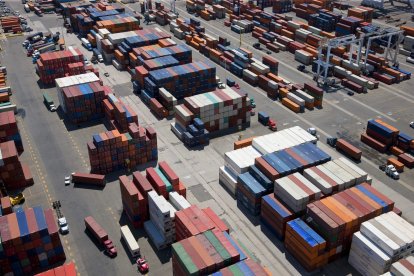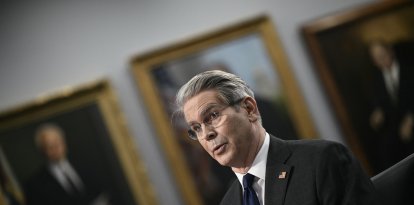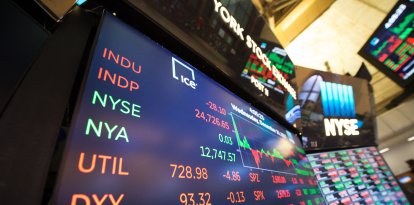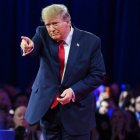Most Americans support international trade and reject tariffs if they mean price increases
A recent Cato Institute survey shed light on Americans' views of trade with other countries, which 47% think is rigged to hurt the United States.

Port in New Jersey
International trade has a good reputation in the United States. Sixty-six percent of Americans think it is good for the national economy, while 58% think it helped improve their own standard of living.
This was revealed in a recent Cato Institute survey commissioned by YouGov. Americans' views on trade from the poll come as the presidential campaign enters the economic arena, after Harris unveiled a controversial anti-inflation plan and retorted Trump's promise to remove tip taxes.
If economic ideas can often result in bipartisan agreement, the poll reveals that the opposite is also true: hypothetical tariffs from a second Trump presidency would be rejected by 65% of Democrats, while they would be supported by 57% if it were a Biden policy. Republicans also back the policy to a greater or lesser extent depending on which party occupies the Oval Office, although the gap is less wide.
In favor of tariffs?
Sixty-four percent of Americans believe that trade increased the variety of products on the shelves, while a smaller percentage, 44%, thought it served to spur technological innovation.
However, 80% thought that international trade harmed the domestic manufacturing industry. Fifty-nine percent think that China is taking advantage of the United States through unfair trade practices, while 47% think that America has been cheated in general.
That's probably one of the reasons Americans support some tariffs, explains the Cato Institute. Although it points out that this support diminishes when it would lead to a rise in prices. For example, while 62% would be willing to impose tariffs on some pants to boost domestic industry, the percentage drops to 58% if they are told that the price of the imported product would go up $5, to 34% if it increased $10 and 13% if the increase were $50.
In all, 75% of Americans are worried about tariffs raising prices.
And lowering tariffs? The majority, 62%, think they should only be lowered if the other country does the same. Fifteen percent are on the opposite side of the fence, believing they should not be reduced under any circumstances.
Buy American... but at what cost?
While the majority (55%) think that "American-made" is a guarantee and at equal prices prefer American products, this advantage disappears if the foreign product is cheaper. "[Seven] out of 10 Americans would not pay even $10 more for an American-made frying pan," the Cato Institute lists as an example.
A majority (58%) would also prefer that U.S. companies manufacture everything needed for the country. Companies must be competitive, the majority (61%) also says, "without any government handouts or taxpayer subsidies."
Overestimating China's imports
Eighty-one percent of Americans overestimated China's weight in total imports, with 22% even saying it accounted for more than 75% of the total. As Cato explains, the actual percentage hovers around 15%.
Fifty-five percent also think that the exchange of goods between China and the U.S. increases peace and stability.
Do imports matter to voters?
Voters' top concern is inflation. Forty percent listed it as one of their top three priorities. In third place came jobs and the economy, at 28%, and only in last and 10th place was globalization and tariffs, at a meager 1%.
"Trade issues specifically are not likely to guide their vote choice for president," the institute points out. However, it adds that trade policies "certainly" matter to voters because of their impact on prices, employability and businesses. Campaign teams will be paying attention.
RECOMMENDATION























